
DigiCorp Labs is developing new Web3-based solutions for the Enterprise world. These new manageable enterprise solutions are built on top of the open source blockchain, DigiByte, with a layer for manageable Enterprise solutions. “Manageable” here, means that the solutions can be supported professionally, based upon conditional Service Level Agreements (SLAs). In fact, the challenge is to use open and decentralized solutions such as blockchain, smart contracts and (utility) tokens in the very regulated world of enterprise corporations. This contradiction or paradox is a challenge that we at DigiCorp Labs think we can solve, but it also asks for new, innovative thinking and governance developments.
Governance relates to the decision-making processes within an organization. How is the hierarchy of decisions structured, who is responsible, how are major decisions taken and implemented, and how is authority vested? Those questions have not only to be implemented in an organization's operational system, but the decentralized solution should also comply with these governance models up front. This is the challenge that DigiCorp Labs took on when we started developing Enterprise grade solutions on open-source blockchain infrastructures.
Unfortunately, there is no one-size-fits-all approach. Every company is different, each governance model is situational, and its viability largely depends on a specific set of circumstances. While securing sovereign identities and creating passwordless authentication for employees, the company also needs a central, vested governance model with supportive dashboards. These models must be centered around a set of qualities: integrity, transparency, collaboration and proven performance. So, our decentralized authentication app has to be supported by a central platform that is not only manageable and sustainable, but complies with a range of potential governance needs.
Whatever solution we build - from p2p video conferencing as part of our suite of communication tools, to smart layers, entering a digital environment always requires identification. Therefore, our first focus is on authentication in the most secure way. We used the decentralized authentication functionality of the existing Antum application, but as mentioned in our previous blog, it wasn’t future-proof for enterprise-grade Web3 authentication. Apart from more modern development languages for decentralized authentication, a balanced, centralized management and dashboard functionality was also required. The way we solved this paradox was with the most important IP that we developed last year.
Blockchain has redefined the classic notion of governance and has shaken the very foundations upon which the “old world” of enterprise is built. Blockchain’s main value proposition is decentralization — eliminating gatekeepers or middle-men in transactions to reduce costs, and enabling parties to directly transact with each other; e.g., via smart contracts. On a large scale, this effectively means the removal of centers of authority from whom enterprises request a central governance model. Instead, we are providing these enterprises with the ability to carry out important decisions with all the required dashboard functionality to support, and sovereign employee authority is distributed. The benefit of a central governance model (assuming that a responsible and knowledgeable authority is in charge) is related to the monopoly over decision making. Typically, a central authority will possess all the relevant information to make informed decisions which serve the enterprise’s best interest.
We are now in the beta-testing phase: both decentralized (which looks good) and on a central platform (this is ongoing). Before we start with the pre-agreed Proof of Concept for launch with potential customers, we need to have formally finalized our dual beta-testing. This is planned to be finalized at the end of 2022, with a formal launch scheduled for 2023, to assure our customers have enough proof of quality to install the decentralized apps on their employees’ mobile devices, and to install the central platform for IT admins. Then, the real challenge begins: we need to build out - in full cooperation with the customer - a governance model for the new Web3 environment, in their existing Web2-based infrastructures and experiences.
DigiCorp Labs took on the unique challenge of developing a radical new application on a decentralized, open source blockchain, including the decentral use of sovereign identity-based, passwordless authentication methods in combination with high grade, enterprise-based requirements of serviceability and governance. Our choice to start the journey with future-proof development languages forced us to fully re-develop and rewrite the older, proven Antum solution. We knew in advance that this decision would require more time and testing, but that it would also give us a head start on all other potential initiatives in the market. Looking back, we are glad we took this radical decision and accepted the roller-coaster experience that was to come.